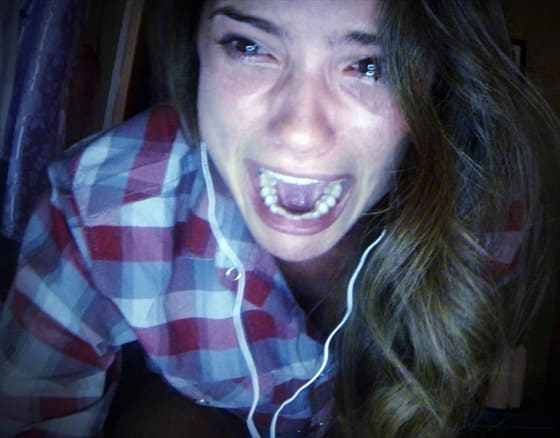Thematically speaking, the high concept social media horror Unfriended is like a somewhat more composed and concise version of MTV's revamped Scream television series. Both cyber-conscious thrillers focus on a group of teenage friends living in the aftermath of tragedy that they may or may not be responsible for. Their preoccupation is that of exposure; fear stems from an omniscient eye that exploits secrets for psychological manipulation.
In Scream, a masked killer taunts their prey with a deep knowledge of their morally abject behaviour; in Unfriended, the seeming ghost of a deceased classmate holds her friends hostage in a Skype group chat, killing them should they lie about any past indiscretions or their involvement in her YouTube humiliation and subsequent suicide.
The irony of these modernist cyber-conscious thrillers, which suggest an Orwellian cultural anxiety, is that they stem from, and feature, a generation that's actively engaged in exhibitionist performance, making readily accessible their every movement and thought. Yet the fear is that of surveillance, both textually and extratextually: the very people outraged by and terrified of having their privacy invaded are those actively living a public life, seeking validation from an unseen audience.
Unfriended, by sheer merit of adopting a computer screen perspective for its duration (borrowing its style and structure from the rather prescient Millennial drama-horror, Thomas in Love), is more successful in capturing this social contradiction. The characters are mostly defined by a single idiosyncrasy: Blaire (Shelley Hennig), the nice one; Matt (Matthew Bohrer), her bland boyfriend; Ken (Jacob Wysocki), the geek; Jess (Renee Olstead), the whiner; Adam (Will Peltz), the volatile dick; and Val (Courtney Halverson), the bitch.
We learn about these characters through Facebook feeds, chat threads and video calls. In a way, it's presented as the gathering of intelligence, digging through information and observing for long enough to determine exactly who is telling the truth about what. This format is effective in reiterating the themes, in addition to generating a very visceral form of tension. We're aware that the unseen force knows everything about these interchangeable ciphers, but there's a sense of mounting dread in their constant refusal to take ownership for their past actions. They're punished — killed — for not taking responsibility, which suggests that the real horror here — and the projected fear of the target audience — is that of a sullied image or the implication of imperfection. These kids would rather die than admit moral fault.
Though Unfriended is pretty conventional and predictable in its progression, the shrewd social satire and occasionally effective panic — threatening on-screen timer countdowns demanding these kids to tell the truth helps propel the action — is an unexpected delight in what would otherwise be a generic teen horror. Sociologically, this tense stylistic experiment denotes a generation in crisis; a generation born into passive objectivity and social performance where embarrassment and denigrated moral vanity is a fate worse than death. And what Unfriended suggests is that this fear is manifesting in a collective refusal to take responsibility or face effective criticism, which, coincidentally, is something that's readily obvious in the landscape of social media.
The Blu-ray doesn't include any special features of note.
(Universal)In Scream, a masked killer taunts their prey with a deep knowledge of their morally abject behaviour; in Unfriended, the seeming ghost of a deceased classmate holds her friends hostage in a Skype group chat, killing them should they lie about any past indiscretions or their involvement in her YouTube humiliation and subsequent suicide.
The irony of these modernist cyber-conscious thrillers, which suggest an Orwellian cultural anxiety, is that they stem from, and feature, a generation that's actively engaged in exhibitionist performance, making readily accessible their every movement and thought. Yet the fear is that of surveillance, both textually and extratextually: the very people outraged by and terrified of having their privacy invaded are those actively living a public life, seeking validation from an unseen audience.
Unfriended, by sheer merit of adopting a computer screen perspective for its duration (borrowing its style and structure from the rather prescient Millennial drama-horror, Thomas in Love), is more successful in capturing this social contradiction. The characters are mostly defined by a single idiosyncrasy: Blaire (Shelley Hennig), the nice one; Matt (Matthew Bohrer), her bland boyfriend; Ken (Jacob Wysocki), the geek; Jess (Renee Olstead), the whiner; Adam (Will Peltz), the volatile dick; and Val (Courtney Halverson), the bitch.
We learn about these characters through Facebook feeds, chat threads and video calls. In a way, it's presented as the gathering of intelligence, digging through information and observing for long enough to determine exactly who is telling the truth about what. This format is effective in reiterating the themes, in addition to generating a very visceral form of tension. We're aware that the unseen force knows everything about these interchangeable ciphers, but there's a sense of mounting dread in their constant refusal to take ownership for their past actions. They're punished — killed — for not taking responsibility, which suggests that the real horror here — and the projected fear of the target audience — is that of a sullied image or the implication of imperfection. These kids would rather die than admit moral fault.
Though Unfriended is pretty conventional and predictable in its progression, the shrewd social satire and occasionally effective panic — threatening on-screen timer countdowns demanding these kids to tell the truth helps propel the action — is an unexpected delight in what would otherwise be a generic teen horror. Sociologically, this tense stylistic experiment denotes a generation in crisis; a generation born into passive objectivity and social performance where embarrassment and denigrated moral vanity is a fate worse than death. And what Unfriended suggests is that this fear is manifesting in a collective refusal to take responsibility or face effective criticism, which, coincidentally, is something that's readily obvious in the landscape of social media.
The Blu-ray doesn't include any special features of note.




